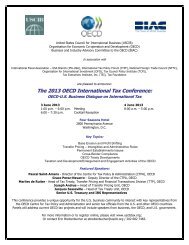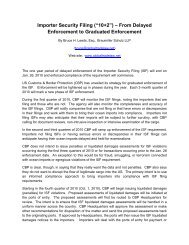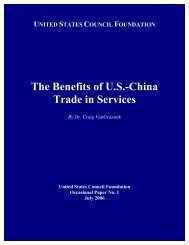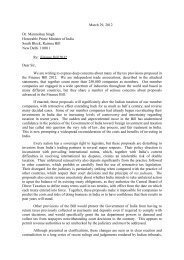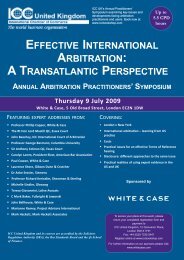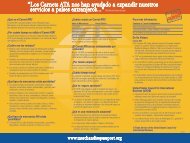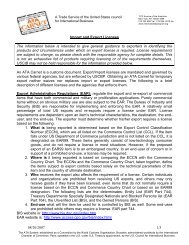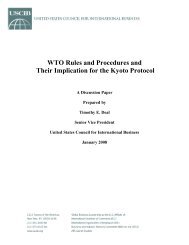The 2012 OECD International Tax Conference - U.S. Council for ...
The 2012 OECD International Tax Conference - U.S. Council for ...
The 2012 OECD International Tax Conference - U.S. Council for ...
You also want an ePaper? Increase the reach of your titles
YUMPU automatically turns print PDFs into web optimized ePapers that Google loves.
<strong>The</strong> <strong>2012</strong> <strong>OECD</strong><br />
<strong>International</strong> <strong>Tax</strong><br />
<strong>Conference</strong><br />
Agenda–Day One, June 4, <strong>2012</strong><br />
I. Welcome<br />
<strong>The</strong> <strong>2012</strong> <strong>OECD</strong> <strong>International</strong><br />
<strong>Tax</strong> <strong>Conference</strong>:<br />
<strong>OECD</strong>-U.S. Business Dialogue<br />
on <strong>International</strong> <strong>Tax</strong><br />
1:00 – 1:30 p.m. Registration<br />
1:30 – 2:00 p.m. • Peter Robinson, President & CEO, USCIB<br />
II. <strong>OECD</strong>’s Work on Transfer Pricing<br />
• Pascal Saint-Amans, Director of <strong>OECD</strong> Centre <strong>for</strong> <strong>Tax</strong> Policy &<br />
Administration<br />
2:00 – 3:15 p.m. A. Intangibles: Definitional Issues and Issues of Legal Versus Economic<br />
Ownership<br />
3:15 – 3:35 p.m. Break Sponsor:<br />
<strong>The</strong> <strong>OECD</strong> project on transfer pricing aspects of intangibles has now been<br />
underway <strong>for</strong> a little more than a year. After three public consultations<br />
with business, it is clear that issues related to the definition of intangibles<br />
and to the determination of which member of a multinational group<br />
of companies is entitled to intangible related returns are the source of<br />
significant controversy. <strong>Tax</strong>payers worry that too broad a definition will cause<br />
governments to find a transfer of intangibles in every fact pattern and lead<br />
to too much reliance on profit split methods. <strong>The</strong>y also think that reliance on<br />
rather vague notions of economic ownership would multiply the number of<br />
controversies. Governments worry that too narrow a definition will suggest<br />
to taxpayers that they are free to transfer something <strong>for</strong> nothing and that too<br />
heavy reliance on notions of legal ownership will allow taxpayers to separate<br />
income from the entities that really earn it. <strong>The</strong> panel will explore whether<br />
answers can be found to these central questions.<br />
• Joe Andrus, Head of Transfer Pricing Unit, <strong>OECD</strong><br />
• David Ernick, Associate <strong>International</strong> <strong>Tax</strong> Counsel, U.S. Treasury<br />
• Krister Andersson, Chairman of the <strong>Tax</strong> Policy Group, BUSINESSEUROPE<br />
• Janice McCart, Partner, Blake, Cassels & Graydon LLP<br />
• Lynne Sullivan, Vice President, <strong>Tax</strong>, Biogen Idec<br />
2 <strong>The</strong> <strong>OECD</strong> <strong>International</strong> <strong>Tax</strong> <strong>Conference</strong> n June, <strong>2012</strong>
<strong>The</strong> <strong>2012</strong> <strong>OECD</strong><br />
<strong>International</strong> <strong>Tax</strong><br />
<strong>Conference</strong><br />
Agenda–Day One, June 4, <strong>2012</strong><br />
III. Cross-Border Compliance<br />
3:35 – 4:35 p.m. B. Transfer Pricing and Administration<br />
<strong>Tax</strong>payers and governments agree that transfer pricing is too complex and<br />
consumes far too many resources. <strong>The</strong> question is what to do about it. <strong>The</strong><br />
<strong>OECD</strong> has undertaken a project on simplifying transfer pricing administration.<br />
It will focus on using safe harbor provisions to create certainty, streamlining<br />
documentation requirements, and doing something about the neverending<br />
controversies around charges <strong>for</strong> home office and regional overhead<br />
expense. <strong>The</strong> panelists will discuss whether transfer pricing can be simplified<br />
and will examine the <strong>OECD</strong>’s progress to date on its simplification agenda.<br />
• Joe Andrus, Head of Transfer Pricing Unit, <strong>OECD</strong><br />
• Sam Maruca, Director, Transfer Pricing Operations, IRS<br />
• Katherine Amos, Senior Director, Transfer Pricing, Tyco <strong>International</strong><br />
• Patricia Lewis, Member, Caplin & Drysdale, Chartered<br />
4:35 – 6:00 p.m. <strong>The</strong> <strong>OECD</strong>, through its Treaty Relief and Compliance Enhancement (TRACE)<br />
project, is developing a standardized system through which countries could<br />
offer streamlined procedures <strong>for</strong> claiming reduced treaty rates of withholding<br />
tax on portfolio investment income and could obtain improved in<strong>for</strong>mation<br />
reporting about the recipients of that income. What are the implications of<br />
the proposed system <strong>for</strong> investors, financial intermediaries and governments?<br />
How will it change the landscape <strong>for</strong> obtaining treaty relief internationally? At<br />
the same time, the FATCA regulations and a recent joint statement by the U.S.<br />
and five European countries suggest that intergovernmental solutions involving<br />
a common reporting standard will be further explored <strong>for</strong> the implementation<br />
of FATCA. How will this be achieved? How do these initiatives interact?<br />
• Philip Kerfs, Advisor, <strong>International</strong> Cooperation and <strong>Tax</strong> Administration<br />
Division, <strong>OECD</strong><br />
• Manal Corwin, Deputy Assistant Secretary (<strong>International</strong> <strong>Tax</strong> Affairs), U.S.<br />
Treasury<br />
• Martin Kreienbaum, Director General – <strong>International</strong> <strong>Tax</strong>ation,<br />
Ministry of Finance, Germany<br />
• Mary Bennett, Partner, Baker & McKenzie LLP<br />
• Keith Lawson, Senior Counsel – <strong>Tax</strong> Law, Investment Company Institute<br />
6:00 – 7:30 p.m. Reception Sponsor:<br />
3 <strong>The</strong> <strong>OECD</strong> <strong>International</strong> <strong>Tax</strong> <strong>Conference</strong> n June, <strong>2012</strong>
<strong>The</strong> 2011 <strong>OECD</strong><br />
<strong>International</strong> <strong>Tax</strong><br />
<strong>Conference</strong><br />
Agenda–Day Two, June 5, <strong>2012</strong><br />
IV. Keynote Address<br />
8:00 – 8:30 a.m. Continental Breakfast Sponsor:<br />
8:30 – 8:50 a.m. Keynote Speaker:<br />
V. <strong>International</strong> <strong>Tax</strong> Issues and Developing Countries<br />
Masatsugu Asakawa, Deputy Vice Minister <strong>for</strong> <strong>International</strong> Affairs,<br />
Ministry of Finance, Japan and Chair, <strong>OECD</strong> Committee on Fiscal Affairs<br />
8:50 – 10:20 a.m. Simplicity, global solutions to global problems, fast and targeted problem<br />
solving projects, fit <strong>for</strong> purpose tools <strong>for</strong> countries in different stages of<br />
development, quick and easy implementation of policy. Even though these<br />
goals set by the <strong>OECD</strong> are diverse and challenging, the <strong>OECD</strong> believes that it<br />
is possible to achieve them, without the one goal excluding the other. Not by<br />
retreating in an ivory tower. But by having an open and inclusive dialogue with<br />
other international organizations, with member and non member economies<br />
and with business. By being involved in the UN work on tax and inviting the<br />
UN to be part of the dialogue at the <strong>OECD</strong>. By tax and development work,<br />
by organizing yearly global events on Transfer Pricing and <strong>Tax</strong> Treaty issues<br />
and through the work of the Forum on <strong>Tax</strong> Administration on Transfer Pricing<br />
and developing economies. But do all these activities mean that the <strong>OECD</strong> is<br />
achieving its goals? What could or should it do better? <strong>The</strong> panel members<br />
will give their opinion on these questions, and will also invite yours.<br />
• Pascal Saint-Amans, Director, <strong>OECD</strong> Centre <strong>for</strong> <strong>Tax</strong> Policy and<br />
Administration<br />
• Mike McDonald, Financial Economist, U.S. Treasury<br />
• Juan Ricardo Ortega López, Commissioner of the DIAN, Colombia’s<br />
Customs and <strong>Tax</strong> Administration<br />
• Stig Sollund, Director General, <strong>Tax</strong> Law Department, Ministry of Finance,<br />
Norway<br />
• Carol Dunahoo, Partner, Baker & McKenzie LLP<br />
• Alan McLean, Executive Vice President, <strong>Tax</strong> and Corporate Structure,<br />
Royal Dutch Shell<br />
• Richard E. Stern, Program Manager, Global <strong>Tax</strong> Simplification, FIAS,<br />
World Bank Group<br />
4 <strong>The</strong> <strong>OECD</strong> <strong>International</strong> <strong>Tax</strong> <strong>Conference</strong> n June, <strong>2012</strong>
<strong>The</strong> 2011 <strong>OECD</strong><br />
<strong>International</strong> <strong>Tax</strong><br />
<strong>Conference</strong><br />
Agenda–Day Two, June 5, <strong>2012</strong> continued<br />
10:20 – 10:40 a.m. Break Sponsor:<br />
VI. <strong>Tax</strong> Risk Management and Corporate Governance<br />
10:40 a.m. – 12:00 p.m. <strong>The</strong> financial, economic and now debt crises mean that Governments around<br />
the world are engaged in fiscal consolidation, while corporate tax and tax<br />
avoidance have become the subject of public debate and occasionally<br />
dramatic protests. <strong>The</strong> amounts at stake in some major tax disputes are<br />
measured in billions of dollars. What are the implications <strong>for</strong> corporate risk<br />
management, good governance and <strong>for</strong> the relationships between businesses<br />
and tax administrations?<br />
Luncheon and Keynote Address<br />
12:00 – 1:30 p.m. Luncheon Sponsor:<br />
• Grace Perez-Navarro, Deputy Director, <strong>OECD</strong> Centre <strong>for</strong> <strong>Tax</strong> Policy &<br />
Administration<br />
• Heather C. Maloy, LB&I Commissioner, IRS<br />
• Timothy M. McDonald, Vice President-Finance & Accounting, Global <strong>Tax</strong>es,<br />
Procter & Gamble<br />
• Deborah Nolan, Americas Director, TCRMS, Ernst & Young LLP<br />
Keynote Speaker:<br />
Jose W. Fernandez, Assistant Secretary, Economic and Business Affairs,<br />
U.S. Department of State<br />
5 <strong>The</strong> <strong>OECD</strong> <strong>International</strong> <strong>Tax</strong> <strong>Conference</strong> n June, <strong>2012</strong>
<strong>The</strong> 2011<br />
<strong>The</strong> <strong>OECD</strong> 2011 <strong>OECD</strong><br />
<strong>International</strong> <strong>Tax</strong><br />
<strong>Conference</strong><br />
<strong>Tax</strong> <strong>Conference</strong><br />
Agenda–Day Two, June 5, <strong>2012</strong> continued<br />
VII. Dispute Resolution<br />
VIII. <strong>OECD</strong>’s Work on <strong>Tax</strong> Treaties<br />
1:30 – 2:30 p.m. FTA work on improving MAP through training of auditors; outcomes/follow<br />
up from CTPA Roundtable on Avoiding and Solving <strong>Tax</strong> Disputes, risk management<br />
and the solution of controversies are high on the agenda of multinationals.<br />
Does this mean that Mutual Agreement Procedure and Arbitration<br />
are also being actively pursued by businesses? And are businesses satisfied<br />
with the results of these procedures? <strong>The</strong>re are still important obstacles<br />
that prevent these dispute resolution mechanisms from functioning as they<br />
should. For this reason, the <strong>OECD</strong> revisited this subject during a Roundtable<br />
organised by the Centre <strong>for</strong> <strong>Tax</strong> Policy and Administration of the <strong>OECD</strong> early<br />
this year. What are the most important obstacles that can be identified? What<br />
are the follow up steps that should be taken, by the <strong>OECD</strong>, by businesses, by<br />
tax policy-makers and by tax administrations?<br />
• Marlies de Ruiter, Head of <strong>Tax</strong> Treaty, Transfer Pricing and Financial<br />
Transactions Division, <strong>OECD</strong><br />
• Mike Danilack, Deputy Commissioner (<strong>International</strong>) LB&I, IRS<br />
• Peter Barnes, Senior <strong>Tax</strong> Counsel – <strong>International</strong>, GE<br />
• Michael Quigley, Partner, White & Case LLP<br />
2:30 – 3:15 p.m. A. Beneficial Ownership<br />
<strong>The</strong> concept of beneficial owner was introduced in the <strong>OECD</strong> Model in 1977.<br />
<strong>The</strong> Commentary originally explained that it referred to “an intermediary<br />
such as an agent or nominee” but that was later extended to cover a “conduit<br />
company” acting as “a mere fiduciary or administrator”. Conflicting court decisions<br />
have shown that there was considerable uncertainty as to what “beneficial<br />
owner” means and the <strong>OECD</strong> bravely attempted to clarify the meaning<br />
of the concept. In April 2011, proposed draft changes to the Commentary of<br />
the <strong>OECD</strong> Model <strong>Tax</strong> Convention were released. Judging from the comments<br />
received on these proposed changes, however, not everyone agrees with the<br />
result. <strong>The</strong> panel will examine the proposed changes and some of the comments<br />
that were received; it will also attempt to determine a way <strong>for</strong>ward.<br />
• Jacques Sasseville, Head of <strong>Tax</strong> Treaty Unit, <strong>OECD</strong><br />
• Henry Louie, Deputy to the <strong>International</strong> <strong>Tax</strong> Counsel, U.S. Treasury<br />
• Richard Collier, Partner, PricewaterhouseCoopers LLP<br />
• Archie Parnell, Managing Director, Goldman Sachs<br />
6 <strong>The</strong> <strong>OECD</strong> <strong>International</strong> <strong>Tax</strong> <strong>Conference</strong> n June, <strong>2012</strong>
<strong>The</strong> 2011<br />
<strong>The</strong> <strong>OECD</strong> 2011 <strong>OECD</strong><br />
<strong>International</strong> <strong>Tax</strong><br />
<strong>Conference</strong><br />
<strong>Tax</strong> <strong>Conference</strong><br />
Agenda–Day Two, June 5, <strong>2012</strong> continued<br />
VIII. Conclusions<br />
3:15 – 3:35 p.m. Break Sponsor:<br />
3:35 – 4:55 p.m. B. Permanent Establishment<br />
4:55 – 5:00 p.m. Summing Up<br />
<strong>The</strong> concept of permanent establishment is older and even more elusive<br />
than the concept of beneficial owner. In October 2011, the <strong>OECD</strong> released<br />
proposed draft changes to the Commentary that sought to address a number<br />
of interpretation issues. Some of the proposed changes relate to significant<br />
practical issues experienced by business. Not surprisingly, a lot of comments<br />
were received by the <strong>OECD</strong> on the proposed changes. <strong>The</strong> panel will discuss<br />
some of the more important proposals included in the <strong>OECD</strong> discussion<br />
draft and the comments that have been received on these proposals.<br />
• Jacques Sasseville, Head of <strong>Tax</strong> Treaty Unit, <strong>OECD</strong><br />
• Jesse Eggert, Associate <strong>International</strong> <strong>Tax</strong> Counsel, U.S. Treasury<br />
• Rafic Barrage, Partner, Mayer Brown<br />
• Philip D. Morrison, Principal, Deloitte <strong>Tax</strong> LLP<br />
• Pascal Saint-Amans, Director of <strong>OECD</strong> Centre <strong>for</strong> <strong>Tax</strong> Policy &<br />
Administration<br />
• Carol Doran Klein, Vice President and <strong>International</strong> <strong>Tax</strong> Counsel, USCIB<br />
7 <strong>The</strong> <strong>OECD</strong> <strong>International</strong> <strong>Tax</strong> <strong>Conference</strong> n June, <strong>2012</strong>



